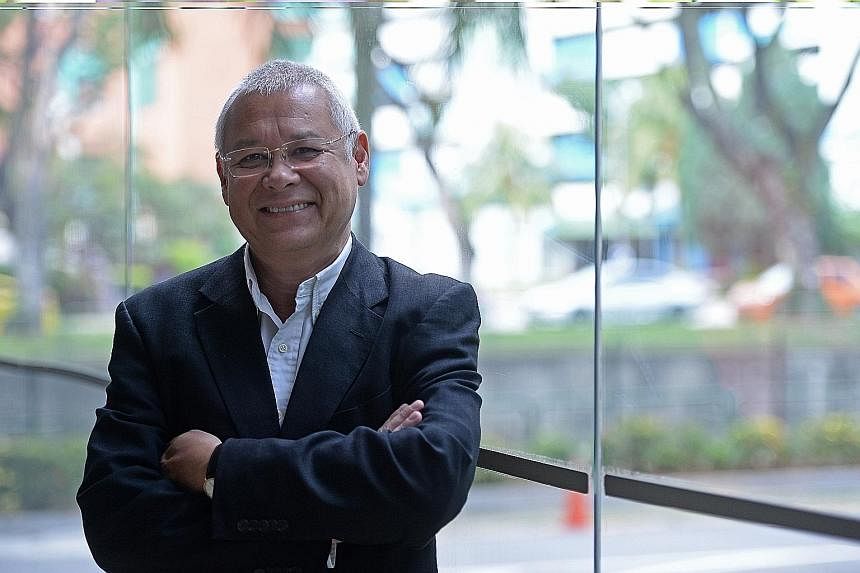Joining the dots between chemistry, horse racing and investment advice seems like a challenge, but financial industry executive David Kuo has made it look easy.
It helps that the 59-year-old grew up in a family where shares were a regular talking point and investing became second nature.
Mr Kuo, who is the Singapore chief executive of The Motley Fool investment advice portal, told The Sunday Times: "My father is a Chinese from Shanghai who went to Hong Kong, so I was always surrounded by people talking about stock markets, particular in Hong Kong. I was always comfortable."
Finance was not his first calling, however. Mr Kuo, who spent his teenage years studying in Singapore, has a PhD in chemistry from Imperial College London.
He pursued the subject with much passion but decided to try his hand at something else, and that path led him first to horse racing and then to The Motley Fool in Britain in 2000.
The portal, which was founded in the United States, set up shop here two years ago, with Mr Kuo moving here to helm it.
After years of analysing the stock market, he has settled on a portfolio where about 60 per cent is made up of income stocks, about 30 per cent comprises growth stocks and 10 per cent is allocated to "what I call my fun, speculative stocks".
"I believe this allocation gives you a firm base, some growth and a little bit of excitement at the very top because investing should always be exciting... But not to the extent that it can keep you up every night. An investor who doesn't have enough sleep is not going to be a very good investor."
Q How did you get started?
A After my PhD, and working in Hong Kong, I went back to Britain after a few years and joined Hilton Group's horse racing division. After that, I joined The Motley Fool as it was looking for financial analysts.
With my background in horse racing and science, they thought I was the ideal candidate.
It was a time when biotechnology was booming in Britain and they didn't have anyone who understood the pharmaceutical industry.
There was also a big boom in online gaming; all these gaming and poker companies going online. I was a fit in both industries.
Things happen in very strange ways and fate plays a big part in your career. I was in the right place at the right time.
Q Describe your investment philosophy. How did you develop it?
A I'm an income investor because I believe in the power of dividends. I always believe money in my pocket is better than in somebody else's.
Therefore, I want the company to pay me the dividends so that I can allocate them in the best possible way.
There are different forms of investing. You have value investing, income investing, people who believe in growth investing, and then you have those who simply follow the market who are called index trackers, and invest through exchange-traded funds - which is a relatively new phenomenon.
You also have the blue-sky thinkers who are very visionary in their investing. They can look at a company and see what it's going to be like in 10 or 20 years' time.
It can take somebody many years to determine what their investing style is. When most people start investing, they try out all the different styles.
I tried my hand at all of those and it was income investing which made the most amount of sense to me and I understood it.
Q What is your best investment?
A A cigarette company. I learnt that a cigarette company doesn't require a great deal of working capital. The machinery it has today is probably the same it had years ago, because it doesn't need to change that much.
I've been holding this for about 12 years.
So what the company can afford to do is pay out a lot of dividends to its investors. It's the re-investing of dividends back into more shares that is actually driving the growth of my investment there.
Q Which was the worst?
A It was investing in a conglomerate. Slowly, the company wanted to invest in a particular area and it divested many of its other businesses to focus purely on the Internet. Things started to go wrong, but I still carried on holding the stock because it was good company.
I lost some money and it also taught me a big lesson that when a company changes its business model, and no longer conforms with why you bought into the company in the first place, then you need to re-evaluate why you bought it.
Q What advice would you give someone new to this and trying to put together a portfolio?
A When you first start investing, try and invest in as many companies as you can because you probably won't know what your investing style is.
Maybe after a year to 18 months, you can look at your portfolio and ask: Which are the stocks I'm most comfortable with? Which are the stocks I appear best at picking?
I'm talking about maybe 20 to 30 different companies - a little bit of each. After a while, you will develop a liking for certain companies, and when that moment comes, you will know what kind of investor you are.


